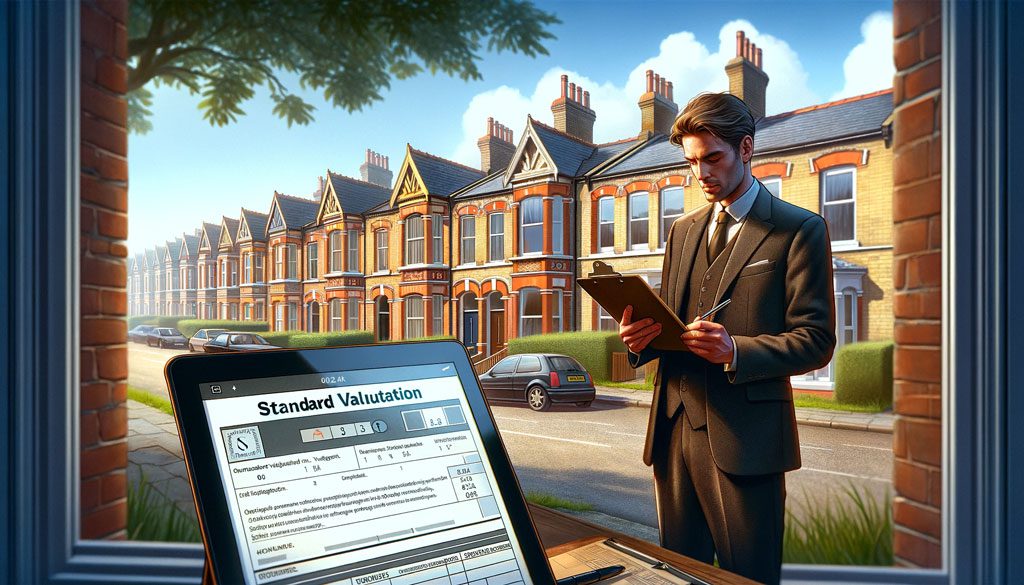So it’s time to get your remortgage underway and you know that you are going to be asked how much is your property worth by the mortgage lender. However, before you decide to remortgage, it’s important to understand the process of determining the value of your property. This assessment helps mortgage lenders determine how much they are willing to lend you. In this guide, we examine how lenders conduct remortgage valuations, ways you can verify if it is an accurate valuation, and how to avoid your property being downvalued.
Is a Remortgage Valuation Necessary?
Getting a remortgage valuation on your property is not mandatory before you apply for your remortgage. However, having an rough idea of your property’s market value is important before beginning the remortgage process. As part of your remortgage application, mortgage lenders typically perform a property valuation survey in order to assess if your property offers sufficient security for the new mortgage.
Why lenders complete a house valuation for a remortgage?
Mortgage lenders require a house valuation during the remortgage process primarily for two critical reasons:
- Security Assessment: The valuation verifies that your house provides sufficient security for the mortgage. It ensures the lender that the property value covers the loan amount in case of any financial discrepancies in the future.
- Loan-to-Value Ratio Calculation: This is crucial for determining the terms of your remortgage. A lower loan-to-value (LTV) ratio often translates to more favorable mortgage deals. The valuation helps lenders calculate the exact percentage of the property’s value you’re borrowing.
During the remortgage application, lenders will either opt for a full valuation by a surveyor, a drive-by valuation, or an automated desk-top valuation. This process gives them an independent assessment of the market value, influenced by comparable sales data.
The outcome of this valuation is pivotal. It sets the loan to value ratio, a significant factor affecting the terms of your remortgage deal. Generally, the lower your LTV, the better the terms you can secure.
How To Get A House Valuation For Remortgage
When you’re gearing up for a remortgage, one of the first steps is determining the current value of your home. This valuation is not just a formality; it’s a critical piece of the puzzle that influences your remortgage terms, including interest rates and loan amounts. But how do you get an accurate and reliable house valuation for this purpose? In this section, we’ll guide you through various methods to obtain a house valuation for your remortgage, ensuring that you step into the process with confidence and the right information at hand.

1) Use online valuation tools
It can be wise to see what is on the market in your area. Go to Zoopla or Rightmove and see if there are any comparable properties on the market. If you can find recently sold property online similar to yours then this will give you an initial idea of how much your property value.
If you are unable to find any comparable properties and their agreed sale price then this can be a little more difficult.
There are a few websites that can be very useful for all property valuations. They have local house price data that can give you the current property prices as well as the historic value of the property.
This will show you every house that has sold down your road and the price paid. These websites get their information from the land registry and therefore are very accurate. A good thing to know is that they do not tend to show any houses that have sold in the past 6 months as it takes this long for the land registry to update their information.
A brilliant example of one of these websites is one called Mouseprice.
2) Use an Estate Agent
This one is a bit more tricky as the local estate agents will give you the value of the property to be put on the market.
This will not be a mortgage valuation and is likely to be inflated. It is worth noting that your local Estate agent is not likely to want to give free valuations so you can have a value of the property for remortgaging purposes.
3) Take an educated guess
For many homeowners, taking an educated guess can be a practical and cost-effective way to estimate the value of their property for remortgage purposes, particularly when a formal valuation isn’t readily available.
- Recent Purchases: If you’ve purchased your home relatively recently and the housing market has been stable, you can estimate its current value based on general market trends since your purchase. It’s important to consider that market growth rates can vary, so use a range that reflects the trends in your specific area.
- Home Improvements: If you’ve made improvements to your property, these can potentially increase its value. Minor upgrades like redecoration may add to the property’s value incrementally, while major renovations such as kitchen remodels or extensions could have a more significant impact. However, the actual increase in value depends on various factors like the quality of the work and the demand for such features in your local market.
This method is particularly useful for those with a good understanding of their local property market and recent trends. It provides a ballpark figure that can guide your remortgaging decisions, though for a more precise valuation, consulting a professional may be beneficial.
What Does A Remortgage Valuation Survey Involve?
When you’re looking into remortgaging your home, understanding the ins and outs of a remortgage valuation survey is crucial. It’s one of those steps that might seem a bit technical, but it’s pretty straightforward once you get the hang of it.
First off, it’s good to know that there are different types of surveys out there, each suited to different needs. These include:
- the mortgage (or remortgage) valuation survey,
- a condition report,
- a homebuyer report,
- and a building survey.
The survey you’ll need depends on various factors like where your home is, its age, and any unique construction elements it might have.


But let’s focus on remortgaging. In most cases, mortgage lenders are looking for a basic valuation. This isn’t a deep dive into every nook and cranny of your property but rather a general assessment to ensure everything’s in order. Sometimes, this means a qualified surveyor will pop over to your place for a quick look-see and jot down their findings. Other times, they might do a “desktop valuation.” This is a bit more behind-the-scenes, where the surveyor uses data from recent sales of similar properties in your area to figure out your home’s value.
There’s also something called a “drive-by valuation.” Yes, it’s exactly what it sounds like: a surveyor takes a glance at your property from the outside. It’s quick, efficient, and gives a general idea of the property’s condition and location.
So there you have it! A remortgage valuation survey isn’t something to sweat about. It’s a routine check-up for your home, ensuring that your remortgage sails smoothly from start to finish.
How much does a remortgage house valuation cost?
The cost of a mortgage valuation typically ranges from £150 to £1,500, depending on your property’s value. However, many lenders offer this service for free as part of their remortgage package. These complimentary valuations, often performed as desktop valuations, add a convenient and cost-effective element to your remortgaging process.
Most mortgage lenders provide this free property valuation when you’re looking to remortgage. The valuations usually take less than half an hour and are a part of the package aimed at attracting new customers. Valuers, who are knowledgeable about local property prices, carry out a quick yet thorough assessment.
However, there’s a caveat to consider. Relying solely on this free valuation can occasionally lead to unexpected challenges. If the valuation doesn’t accurately capture your property’s market value, you may only discover this discrepancy deep into the remortgage process. This can leave you with little time to alter your remortgaging plans, so it’s crucial to approach these valuations with an informed perspective.
What Happens After A Property Remortgage Valuation?
So, you’ve just had your property valuation done for your remortgage – what’s next? This is where the journey gets interesting!
After the valuation, the surveyor will pass their estimate of your property’s worth to your mortgage lender. If the lender gives the thumbs up to the valuation and doesn’t spot any issues, your remortgage process marches on smoothly.
One key piece of info you’ll get from this valuation is your current loan-to-value (LTV) ratio. This is basically how much of your property you own versus how much you owe. For instance, if your home is valued at £250k and you have an outstanding mortgage of £200k, your LTV sits at a neat 80%. Remember, a lower LTV can often mean lower interest rates and more mortgage options for you. It’s like a little financial high five!
What happens if the property value is downvalued?
Now, let’s talk about a twist that might come up: the down valuation. This is when the surveyor reckons your property’s value is less than you or your lender anticipated. When this happens, your lender might go back to the drawing board on your remortgage offer, possibly tweaking the interest rate or the loan amount.
- Why might a property be down valued? It could be because of an overestimated value in your application or maybe some sneaky structural issues with the property.
- Hit with a down valuation? Keep calm and carry on. Your first move should be to chat with your adviser. They can usually get you the detailed report from the valuer, which you’ll want to go through with a fine-tooth comb. If something feels off – say, the comparison properties used don’t seem quite right – you can always bring in examples of what you think are more fitting comparables.
There are often ways to sidestep a down valuation from the get-go and keep your remortgage sailing smoothly. Keeping informed and prepared can make all the difference in steering clear of these bumps in the road.
If the down valuation was by your existing lender the next step will be to move to an alternative lender to see what they feel your property value is. Speak to a mortgage broker who will be able to guide you through the next best steps.
How Can You Avoid a Down Valuation?
Concerned about the possibility of a down valuation during your remortgage process? The key is preparation and understanding your property’s current market value. Here are some steps to help you get a realistic estimate and reduce the risk of unexpected valuation outcomes:
- Research Recent Property Sales: Start by investigating the sale prices of properties similar to yours in your neighborhood. Focus on sales within the past three to six months. This data will provide a clearer picture of the current market trends and the likely valuation range for your property.
- Consult Local Estate Agents: Local estate agents have their finger on the pulse of the property market. Their insights can be invaluable in estimating your home’s value. They can offer guidance based on recent sales and current market conditions in your area.
- Understand the Valuer’s Perspective: Keep in mind that the valuer will assess your property’s value based on its present condition. Future plans for renovations or improvements, such as a new kitchen, won’t be taken into account in the current valuation. It’s essential to present your property in the best possible state at the time of valuation.
By taking these proactive steps, you can better align your expectations with the realities of the property market and potentially avoid the challenges of a down valuation during your remortgaging process.
Related Reading: How long does a remortgage take?
Remortgage Valuation Tips
Reading to start your remortgage journey? Here are some insider tips to navigate the remortgage valuation process like a pro! Remember, knowledge is power, especially when it’s about your home and finances.
- Be Prepared: Before the valuer steps in, make sure your house is in tip-top shape. A good first impression can make a subtle difference. Think tidy, clutter-free, and any minor repairs done. It’s like dressing up your house for a very important date!
- Know Your Numbers: Have an idea of your property’s value beforehand. Do a bit of homework – check out recent sales in your area, and maybe even peek at online valuation tools. This way, you won’t be caught off guard by the valuer’s estimate.
- Highlight Upgrades: If you’ve made significant improvements to your property, don’t be shy to point them out. New kitchen? Loft conversion? Let the valuer know! These upgrades could positively impact your valuation.
- Stay Informed: Understanding the market trends in your area can give you an edge. If you’re aware that property values have been rising, or if there are new developments boosting your area’s appeal, this information can be gold during a valuation.
- Ask Questions: If something in the valuation doesn’t sit right with you, ask about it. It’s your property, after all. If the valuation seems off, inquire how it was determined. A little curiosity can go a long way.
- Consider Timing: Timing can impact property values. If your neighborhood is on the upswing, it might be wise to time your valuation to coincide with these positive changes.
- Have Your Documentation Ready: Keep all your property-related documents handy. This includes any legal paperwork, proof of home improvements, and so forth. It’s always better to be over-prepared than to scramble at the last minute.
- Stay Realistic: While it’s great to aim high, keep your expectations realistic. The market value might not always match your estimate, but staying grounded can help you make the best of the situation.
Remember, the valuation is a key step in your remortgage process. These tips aren’t just advice; they’re your toolkit for success. Approach your valuation with confidence, preparation, and a dash of savvy, and you’re all set to ace it!


Obtaining a remortgage valuation with a mortgage broker
Navigating the remortgage process can be much smoother with a knowledgeable ally by your side – a mortgage broker. These professionals are not just experts in remortgaging; they have a deep understanding of property valuations in your area. By partnering with a mortgage broker, you gain access to their wealth of experience and specialized software tools. These resources enable them to provide a reliable and accurate valuation of your property, tailored to your unique situation.
Pro Tip: Keep in mind that banks and building societies set their interest rates based on your loan-to-value (LTV) ratio. Accurate property valuation is crucial here. An incorrect valuation could mean a higher interest rate, potentially costing you thousands over the life of your mortgage. With a mortgage broker, you’re better positioned to get a valuation that accurately reflects your property’s worth, ensuring you secure the best possible terms on your remortgage.
Remortgage Valuation FAQs
Discover quick, clear answers to your most pressing questions about the remortgage valuation process:
What Happens During a Remortgage Valuation?
In a remortgage valuation, a professional assesses your property's current market value, focusing on condition, size, and local market comparisons.
Can I Remortgage Without a Valuation?
Typically, a valuation is necessary for remortgaging to ascertain the property's value, which influences loan terms. Some lenders might use automated valuation methods.
What Does a Remortgage Surveyor Look For?
A surveyor evaluates the property's condition, age, size, layout, significant improvements or defects, and local market conditions.
Is It Worth Getting Your House Valued Before Remortgage?
Although it is not required, a pre-remortgage valuation can provide insight into potential loan terms and prepare you for any variances in the lender’s assessment.
What Is a Down Valuation on a Remortgage?
A down valuation occurs when a lender's valuation is lower than your expected property value, potentially affecting loan terms.
How Do I Prepare My House for a Mortgage Valuation?
Ensure your property is well-maintained, tidy, and any minor repairs are completed to positively influence the valuation.
How Much Does a House Valuation for a Mortgage Cost?
Valuation costs vary, typically ranging from £150 to £1,500, depending on the property's value. Although many lenders offer free basic valuations for your remortgage.
How Long Does a Remortgage Take After Valuation?
The remortgage process duration post-valuation varies, typically ranging from a few weeks to a couple of months, depending on several factors.


